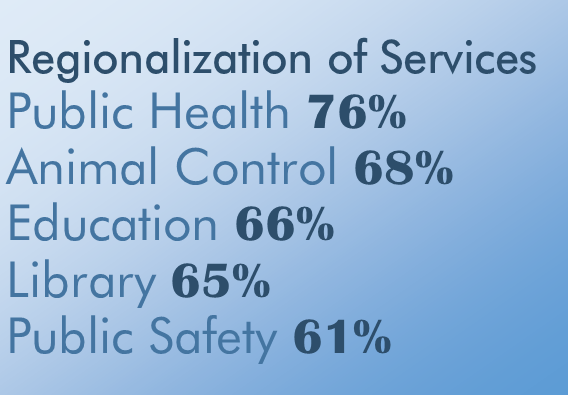CT Residents See Regionalism as Viable Option for Local Services; Highway Improvement A Transportation Priority
/Connecticut residents believe that some services traditionally handled by individual municipalities can be effectively delivered regionally. A new statewide survey found that public health earns the most support for a regional approach and public safety the least. More than 3 in 4 people (76%) say that public health services can be provided on a regional basis, followed by animal control (68 percent) and education (66 percent). The survey found that 65 percent of state residents believe that library services can be delivered regionally, and 61 percent share that view regarding public safety services.
The survey for InformCT, a public-private partnership that provides independent, non-partisan research, analysis, and public outreach, was administered by researchers from the Connecticut Economic Resource Center, Inc. (CERC) and Smith & Company. The analysis is based on the responses of survey of 510 state residents, with a margin of error of 5 percent. 
Survey respondents were asked about regionalization of services in surveys conducted in the first three quarters this year, and support was generally consistent – respondent’s views of regionalizing the various services did not vary more than four percentage points for any of the policy areas during that time. Favorability of regionalization of public health services has increased each quarter, while regionalizing education has increased from Quarter 1. While support for regional public safety services has also increased from Quarter 1, it received the least support among the services queried in each survey. Only regionalizing libraries has seen a decline from the first quarter, and preferences for regionalizing animal control has held steady.
 “Increasingly, towns will not be able to afford to sustain the level of services to which they have become accustomed, as budget pressures increase along with a reluctance to raise taxes. Residents showed concern, and a willingness to consider regionalism as a partial solution,” said Robert W. Santy, who serves as Board Chair of Inform CT and is President & CEO of the Connecticut Economic Resource Center (CERC) Inc.
“Increasingly, towns will not be able to afford to sustain the level of services to which they have become accustomed, as budget pressures increase along with a reluctance to raise taxes. Residents showed concern, and a willingness to consider regionalism as a partial solution,” said Robert W. Santy, who serves as Board Chair of Inform CT and is President & CEO of the Connecticut Economic Resource Center (CERC) Inc.
The also found that the most important factor when choosing a town in which to live, is property taxes, followed by the quality of the school system. Those factors earned 53 percent and 51 percent of respondents, respectively, who describe the factor as “very important” - the only aspects described as very important factor by a majority. Other factors deemed very important include recent appreciation of home values (30 percent), proximity to transportation and employment (29 percent) and proximity to entertainment ad amenities (24 percent).
The survey also asked about transportation in Connecticut, finding that 74 percent said they use their car almost every day. Other modes of transportation were not nearly as popular. More than 80 percent indicated that they had used a local bus (86%), long distance bus (91%), commuter rail (87%), Amtrak (92%), an airplane (92%) or a bicycle (82%) only once, or not at all, in the past month. Regarding state spending to improve transportation, respondents ranked highway improvements as the highest priority by a wide margin, with commuter rail, local bus, and bicycle lanes/pedestrian walkways, ranked next highest. Highway improvements was described as the highest priority by more respondents than the other six options combined.































